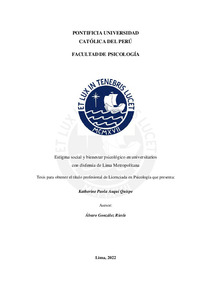| dc.contributor.advisor | González Riesle, Álvaro | |
| dc.contributor.author | Auqui Quispe, Katherine Paola | |
| dc.date.accessioned | 2023-03-01T16:00:31Z | |
| dc.date.available | 2023-03-01T16:00:31Z | |
| dc.date.created | 2022 | |
| dc.date.issued | 2023-03-01 | |
| dc.identifier.uri | http://hdl.handle.net/20.500.12404/24378 | |
| dc.description.abstract | El objetivo de la presente investigación tiene como finalidad conocer la experiencia de
estudiantes universitarios con disfemia, analizándolo desde el estigma social y bienestar
psicológico, cuyos objetivos específicos fueron los siguientes: (1) explorar las dificultades en
las relaciones sociales que enfrentan estos estudiantes y (2) explorar las estrategias que
emplean estos estudiantes para mitigar los efectos negativos de la disfemia en el ámbito
universitario. Para ello, se realizaron 10 entrevistas semiestructuradas a estudiantes del grupo
de apoyo Habla Libre. Los resultados evidenciaron que las reacciones de la sociedad,
familiares y entorno universitario por medio de burlas, comentarios negativos y conductas
discriminatorias generan en estas personas la experiencia de ansiedad, tristeza, miedo y
comportamientos evasivos. Estas actitudes de prejuicios, estereotipos y discriminación
afectan el bienestar psicológico, especialmente en la autoaceptación, crecimiento personal y
propósito vital. Sin embargo, existen algunas herramientas que ayudan a reducir el impacto
del estigma como son los grupos de apoyo y la difusión de información por medio de la
educación. Por un lado, los grupos de apoyo ofrecen un espacio seguro y de confianza donde
las personas pueden sentirse libres de poder expresarse y no ser juzgados por su manera de
hablar. Respecto a la difusión de información sobre la disfemia, desde un enfoque educativo
se permitiría informar a la sociedad sobre este tema, ayudando así a modificar aquellas
creencias o ideas erróneas sobre la disfemia para reducir el efecto en la calidad de vida de
estos individuos. | es_ES |
| dc.description.abstract | The objective of the present investigation is to know the experience of university students
with dysphemia, analyzing it from the social stigma and psychological well-being, whose
specific objectives were the following: (1) to explore the difficulties in social relationships
that these students face and (2) explore the strategies used by these students to mitigate the
negative effects of dysphemia in the university setting. For this, ten semi-structured
interviews were conducted with students from the Habla Libre support group. The results
showed that the reactions of society, family members, and the university environment, such as
teasing, negative comments, and discriminatory behaviors generate in these people the
experience of anxiety, sadness, fear and avoidance behaviors. As indicated by the participants,
these attitudes of prejudice, stereotypes, or discrimination affect their psychological well being, especially in self-acceptance, personal growth, and vital purpose. However, there are
some tools that help reduce the impact of stigmas, such as support groups and disseminating
information through education. Support groups offer a safe and trusting space where people
can feel free to express themselves and not be judged for their way of speaking. Regarding
the dissemination of information about stuttering, from an educational approach, it would be
possible to inform society about this issue, thus helping to modify those beliefs or erroneous
ideas about stuttering to reduce the effect on the quality of life of these individuals. | es_ES |
| dc.language.iso | spa | es_ES |
| dc.publisher | Pontificia Universidad Católica del Perú | es_ES |
| dc.rights | info:eu-repo/semantics/openAccess | es_ES |
| dc.rights.uri | http://creativecommons.org/licenses/by-sa/2.5/pe/ | * |
| dc.subject | Tartamudez--Aspectos psicológicos--Investigaciones | es_ES |
| dc.subject | Estigma (Psicología social) | es_ES |
| dc.subject | Bienestar--Aspectos psicológicos | es_ES |
| dc.title | Estigma social y bienestar psicológico en universitarios con disfemia de Lima Metropolitana | es_ES |
| dc.type | info:eu-repo/semantics/bachelorThesis | es_ES |
| thesis.degree.name | Licenciado en Psicología | es_ES |
| thesis.degree.level | Título Profesional | es_ES |
| thesis.degree.grantor | Pontificia Universidad Católica del Perú. Facultad de Psicología | es_ES |
| thesis.degree.discipline | Psicología | es_ES |
| renati.advisor.dni | 07181129 | |
| renati.advisor.orcid | https://orcid.org/0000-0001-5240-1277 | es_ES |
| renati.author.dni | 75538015 | |
| renati.discipline | 313016 | es_ES |
| renati.juror | Gonzalez Riesle, Alvaro | es_ES |
| renati.juror | Anaya Rosales, Rogger Holfre | es_ES |
| renati.juror | Cassaretto Bardales, Monica de los Milagros | es_ES |
| renati.level | https://purl.org/pe-repo/renati/level#tituloProfesional | es_ES |
| renati.type | https://purl.org/pe-repo/renati/type#tesis | es_ES |
| dc.publisher.country | PE | es_ES |
| dc.subject.ocde | https://purl.org/pe-repo/ocde/ford#5.01.00 | es_ES |







